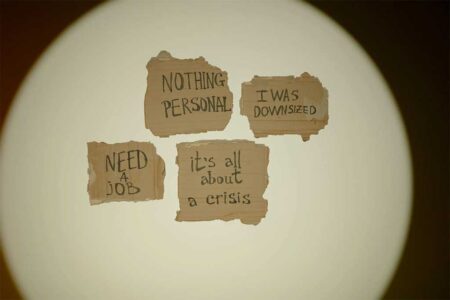We know quitting a job is never easy, but it is possible to do it with poise. These eight tips will save you from stepping on any toes and losing valuable networking connections.
Everyone loves a good job-quitting story—the more dramatic and bridge-burning, the better. Think Tom Cruise and his “The goldfish are comin’ with me!” speech in Jerry Maguire, or, more recently, the JetBlue flight attendant who told off a rude passenger, grabbed two beers from the drink cart, and exited his plane via the inflatable emergency slide. Of course, quitting a job in such an epic manner isn’t in the cards for most of us (though they’re still fun to watch and read about).
The further along we get in our careers, the less dramatic our reasons are for quitting—and the more easily our bosses can jeopardize our future employment with one bad reference.
But regardless of the cause, quitting’s never an easy thing to do. Miscommunication abounds, feelings get hurt, and potential networking ties are irrevocably severed—but only if you don’t know how to do it right. It’s possible to quit a job gracefully if you take the right steps and avoid certain pitfalls.
Tell your boss in person that you’re leaving.
He or she should be the first person in the office to know that you’re quitting. Even if you swear your closest coworkers to secrecy, word has a way of getting around quickly, and you don’t want your boss to hear it from someone else.
Schedule the talk beforehand so that the two of you will have sufficient time to hash out the details of your exit. Showing up unannounced with that kind of news might make your boss feel even more stressed out.
Explain your reasons for quitting, but don’t get upset or be hurtful.
Now’s not the time to talk about how your coworkers conspire against you, nor should you start crying and apologizing for your departure.
All you need to say is that you’re leaving to pursue other opportunities. Bringing up any problems you have with the company is unprofessional and potentially damaging, especially if you plan on staying in the same field.
Industries are surprisingly small, and people do talk; if your boss thinks you’re ungrateful or rude, that opinion could spread faster than you might think, and you don’t want future employers getting a bad impression of you before you’ve even met them.
Sobbing about what a difficult decision it was doesn’t help matters either. No need to look emotionally unstable to ease your guilt; your employer will understand if you explain things rationally.
Write a resignation letter and give proper notice.
The resignation letter is for your records and the company’s records, so keep it brief and professional—you need only include the fact that you’re leaving and your last day’s date.
The reasons why are unnecessary. Speaking of the last day, be sure to give your employer at least two weeks’ notice when quitting. Really, the more time your company has to find your replacement, the better, but anywhere from two weeks to a month is standard.
Keep up the hard work until the end.
It’s all too easy to start slacking as soon as your job has an expiration date, but that’s unfair to your coworkers. Finish all projects and tie up any other loose ends.
Ask your boss if there’s anything you can do to make the transition easier, such as training your replacement or at least creating a set of detailed instructions for someone else to use.
Nice gestures like these solidify the good relationships you’ve formed while working there. Remember, former colleagues can be great networking connections.
Tidy up your desk.
You’re going to take home all of your personal belongings, but don’t leave the cleanup session at that. Wipe up dust, clean off your keyboard, and throw away trash. Whoever works there after you’re gone shouldn’t have to deal with a dirty desk.
If you ask for an exit interview, be honest but stay polite.
Exit interviews are either held in person or provided as a form that your company’s human resources department has filled out. They’re not usually required, but employees can request them upon leaving.
The questions are similar to what you’ll talk about with your boss upon quitting, but they’ll also include questions about your impressions of the company, your boss, and so forth.
If you’re uncomfortable talking with your boss about these things but still want to voice your opinion, an exit interview’s the perfect way to do just that. But bear in mind that the company puts the answers in your file and it becomes part of your employment history.
Should you ever want a job there again (hey, you never know), don’t be too harsh. On the other hand, if there are fundamental concerns you have with a certain aspect of the job or office, don’t be afraid to talk about them.
Don’t ask your boss for extra perks.
This might come as a surprise, but people actually ask for things when they’re leaving a company. You’re putting your boss in a bind—why should he or she give you unemployment, or extend your quitting date so that you have medical insurance for an extra month?
Believe it or not, plenty of people request these sorts of exceptions. Your boss is under no obligation to help you out, but if you’ve been a good employee, he or she may want to anyway. Hope for an offer, but don’t expect one, and definitely don’t ask for one first.
Keep in touch.
The farewell email should be friendly but to the point: tell your coworkers where you’re going, where you can be reached, and that it was a pleasure working with them.
Don’t brag about your next job or write a long-winded essay on how each and every one of them touched your heart. But do insist that you all keep in touch, since you’ll probably run into each other or work together again if you remain in the same field.
Above all, ask yourself this question as you spend your last weeks at your job: could this be held against me?
Even if you hate your company or are leaving your industry, you don’t want to burn any bridges, especially in this rough economy, in which even the best and brightest among us are struggling to find work. Leave on a good note, and make sure your employers are sorry to see you go.
This story first appeared on More by Vicki Santillano.









